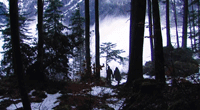With a Russian cast, minimal French dialogue, and geographically ambiguous setting, Philippe Grandrieux’s A Lake (Un Lac), like his multilingual preceding film, La Vie nouvelle, expounds on the notion of a borderless cinema – one that not only dismantles the man-made frontiers between nations and cultures, but also the boundaries between image and sound, material and light, logic and instinct. And like the indeterminate chronology of La Vie nouvelle, A Lake also takes place in a hermetic environment that seems equally primordial and post-apocalyptic, where human interaction is reduced to its essence: a knowing glance, a comforting touch, a frenzied exertion, an anguished cry.
In A Lake, the figurative Garden of Eden is a barren, winter forest shrouded in mist where a lumberjack, Alexi (Dmitry Kubasov) lives in a remote cabin near a lake. Prone to increasingly frequent bouts of epilepsy, Alexi’s trips to the woods are as much a necessary ritual for survival as it is a rugged communion with nature, often ending up burrowed by convulsions into the snow until the seizure passes and he is able to walk home. There are other members in the household – a blind mother, Liv (Simona Huelsemann), a returning father, Christian (Vitaly Kishchenko), a younger brother, Johannes (Artur Semay) – but they all remain in the periphery, drifting in an out of his searching gaze, and only his sister and soul mate, Hege (Natalie Rehorova) can penetrate his frustration and despair over a body that continues to betray him. It is a lonely, if reassuring and predictable existence until a stranger, Jurgen (Alexei Solonchev) comes into their lives and, like the felled trees in the forest, momentarily, but irreparably, disturbs their fragile paradise.
Loosely reminiscent of Aleksandr Sokurov’s Mother and Son in its invocation of Caspar David Friedrich’s gothic landscapes to convey a sense of profound isolation, intimacy, and longing, A Lake, nevertheless, remains very much a Grandrieux film, bearing his singular imagery of synaptic, perturbating camerawork, defocused framing, and liminal compositions that transform everyday movements and rhythms into a frisson of textured, abstract impulses that feed the senses. Eschewing the moral ambiguity and transgressive nature of his earlier films, A Lake also represents an aesthetic shift in Grandrieux’s cinema towards the idea of nature as integral character: a transition that is implied in Alexi’s recitation of a passage about the unity of the soul between man and beast, as well as his lack of dominion over the ephemeral forces of nature. It is this image of humanity receding into the environment that ultimately creates the visceral poetry of A Lake, capturing the body as landscape in all its gestures and paroxysms, contours and spaces, violence and ecstasy.
© Acquarello 2005. All rights reserved.
First published in AFI Fest Daily News, 10/01/09.
